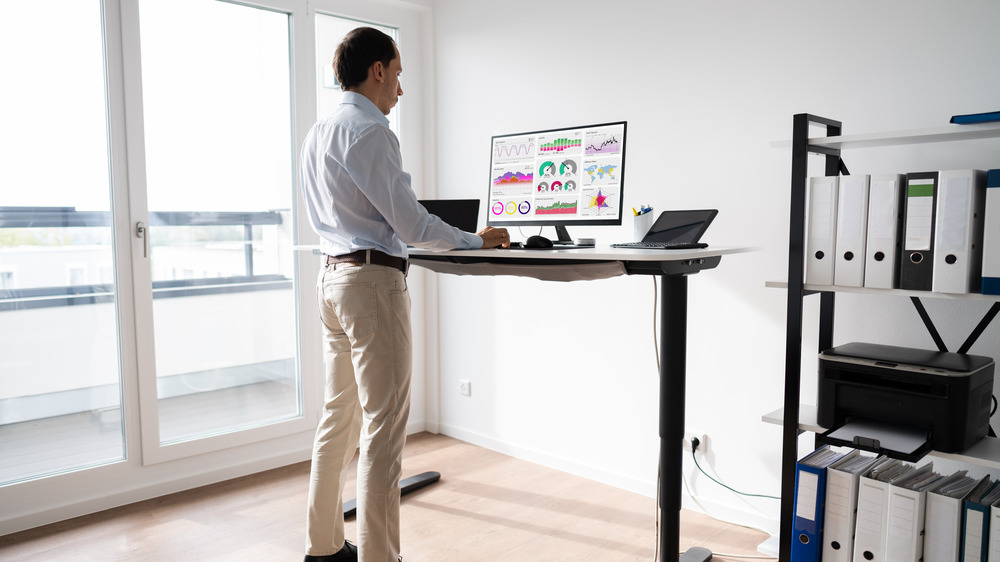When You Start Using A Standing Desk, This Is What Happens
Sitting all day at your desk can be a real drag. Not to mention, the American Heart Association, the American College of Cardiology, and the American College of Sports Medicine have all reported that a sedentary lifestyle can increase the risk of chronic health problems like obesity and heart disease (via The American Heart Association). That's why standing desks, or desks that move up and down, allowing you to sit or stand, have become quite popular over the last few years, according to the Society for Human Resource Management. More and more companies are starting to provide standing options for their employees and some even subsidize standing desk purchases for their employee's work from home set-ups.
But are they all they're cracked up to be? And will using one solve all your back and neck problems, help you burn more calories and lower your risk of chronic conditions?
A standing desk may not help you lose weight
When it comes to weight loss, unfortunately a standing desk may not help. According to one study published in 2016 in the Journal of Physical Activity and Health, study participants who stood only burned an extra eight calories per hour when compared with sitting (88 calories vs. 80 calories). But researchers measured participant's oxygen levels in relation to calories burned and found that walking for an hour burned nearly 100 extra calories when compared with just sitting (210 calories vs. 80 calories).
All this to say, you shouldn't rely on standing up to help you meet your exercise goals, but you could try walking around the block on your lunch break, in between meetings, or even while you're taking a phone call. You'll burn calories and get some fresh air — and it's likely to be a nice break from your computer.
Standing more could contribute to better overall health
And when it comes to chronic health conditions, researchers are still trying to understand how standing more, specifically at standing desks, could contribute to better health, reports the American Cancer Society.
The American Cancer Society's strategic director of Cancer Prevention Study 3, Alpha Patel, Ph.D., says in an article on their website, "Sitting time research is still in its infancy, and we are trying to understand whether it's the total amount that you sit or how frequently you break up those bouts of sitting that are related to disease risk. While we continue to learn what is driving this relationship, it's clear that cutting down on the time you spend sitting is good for your health," says Dr. Patel.
Even though you won't burn loads of extra calories and the health impacts are still being researched, it's not a bad idea to try a standing desk if that interests you. You will, of course, stand more, which can fight the effects of a sedentary lifestyle and also take the pressure off your lower back and shoulders, which will reduce pain.
Just make sure your workstation is set up properly so standing up doesn't have a negative impact on your health. According to UCLA Health, poor standing posture could lead to weaker abdominal muscles, locked knees and standing on one leg, all things that can cause pain and other problems later on.



